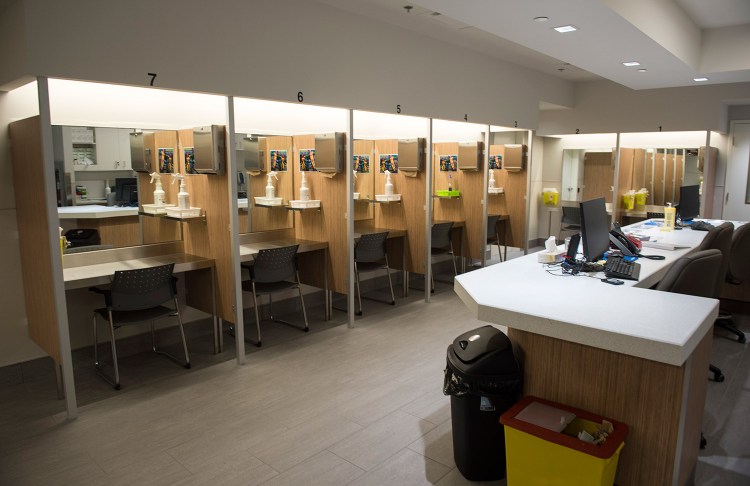Drug treatment advocates unveiled wide-ranging recommendations Thursday to combat the state’s opioid crisis, including expanding the number of needle exchanges, detox centers and methadone clinics, establishing safe injection sites and decriminalizing all drug possession.
The extensive scope of the 24-page report reflects the severity of the problem, said Kenney Miller, executive director of the Health Equity Alliance, which operates programs in Bangor, Ellsworth and Machias. Maine reported 418 drug overdose deaths in 2017 and 180 deaths through the first six months of 2018.
Thousands of Mainers gained access to substance use treatment when Gov. Janet Mills expanded Medicaid in January. But having a new administration willing to tackle the opioid crisis has emboldened activists.
“This is a road map for long-term solutions,” said Miller, whose organization provides needle exchanges, a health clinic, sexual health services, medical case management, support services and other programs.
The report is from the Maine Coalition for Sensible Drug Policy, which includes the Health Equity Alliance, Church of Safe Injection, Survivors Union of Portland, state Rep. Charlotte Warren, D-Hallowell, and others.
The report arrives as the Mills administration is preparing to announce its comprehensive plan to address the opioid crisis.
“The Administration will review these recommendations and take them into consideration as it works with a wide variety of stakeholders to develop and implement a comprehensive approach to combating this devastating epidemic,” Mills spokesman Scott Ogden said in a statement.
The report recommends establishing needle exchange programs, detox centers and methadone clinics in every Maine county.
Needle exchange programs are effective at preventing diseases caused by sharing used needles, such as AIDS and hepatitis C, according to annual reports by the Maine Department of Health and Human Services. Maine’s needle exchange programs operate in Portland, Bangor, Ellsworth, Machias and Augusta.
More than 5,200 Mainers used the exchanges between November 2016 and October 2017, according to the DHHS report. Lewiston’s needle exchange site closed in 2017.
“These are evidence-based programs that have worked for 30 years with proven outcomes,” Miller said. “Every case of hepatitis C that we prevent, for instance, saves thousands of dollars in health care costs.”
Miller said he recognizes that parts of the plan will be controversial, such as decriminalizing drug possession.
“If we are going to really treat substance use disorder as a public health problem, then criminalizing possession and punishing people is not what we should be doing,” he said. “The evidence shows that compassionate care works better than a punitive system. Criminalizing the behavior also adds to the stigma of substance use disorder.”
Safe injection sites, where users can use opioids and other drugs and also get connected to treatment and clean needles, are illegal under federal law. But Miller said the crisis is so great that it shouldn’t stop cities from starting up safe injection sites. Mills officials have said safe injection sites are a “potential life-saving option but face significant legal hurdles.”
Jesse Harvey, founder of the Church of Safe Injection, which provides clean needles and the opioid antidote Narcan at a mobile site, said the plan is comprehensive, but that is what is needed to truly solve the crisis.
“As a society, we’ve had decades of half-measures and quarter-measures, and they haven’t worked. We might as well look at all the possible solutions,” he said.
Joe Lawlor can be contacted at 791-6376 or at:
jlawlor@pressherald.com
Twitter: joelawlorph
Send questions/comments to the editors.




Success. Please wait for the page to reload. If the page does not reload within 5 seconds, please refresh the page.
Enter your email and password to access comments.
Hi, to comment on stories you must . This profile is in addition to your subscription and website login.
Already have a commenting profile? .
Invalid username/password.
Please check your email to confirm and complete your registration.
Only subscribers are eligible to post comments. Please subscribe or login first for digital access. Here’s why.
Use the form below to reset your password. When you've submitted your account email, we will send an email with a reset code.